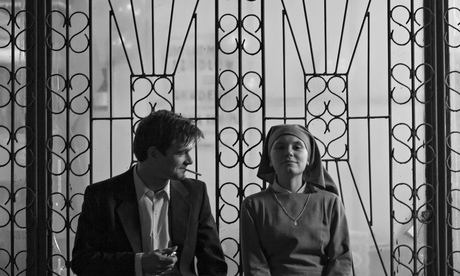
This eerily beautiful black-and-white film from Paweł Pawlikowski is, along with Maps to the Stars, one of two outstanding movies now on general release after festival play that seem even fresher and clearer on a repeat viewing. Ida, which pulls off the remarkable trick of looking as if it was made when it was set – the early 60s – feels more like a restored and rediscovered classic than a new movie. I first saw it at last year’s London film festival; revisited, Ida delivers its anger and pain with a new intensity, while turning down the ambient temperature even further. There really is a bitter, wintry cold here: it is illuminated by the stark, daylit whiteness of snow, and you can feel the chill in those barnyards and draughty churches. This film has its own kind of freezer burn.
Agata Trzebuchowska is tremendously mysterious as a 17-year-old novitiate in a remote convent: she has the impassivity and inscrutability of youth. This is someone to whom literally nothing has happened in her life, and now we will watch her react, or try to conceal her reaction, to an onslaught of momentous events. Ida has something of the classic Polish film school, along with touches of Béla Tarr and Aki Kaurismäki. The cinematography shows a fondness for alienated compositions, in which faces are low down in the frame with an oppressive blankness overhead – although the images in the convent often resemble something by Vermeer. The biggest influence is probably François Truffaut and his 400 Blows; in fact, its final shot might represent a subtle commentary or variation on the last moments of Truffaut’s film.
It is 1962, and Anna is about to take her final vows in the convent where she was left as an orphan baby in 1945 by persons unknown. But Anna has one surviving relative, and the Mother Superior – who has clearly guessed more about Anna’s background than she admits – insists that she contact this woman before she makes the irrevocable decision. The relative turns out to be her aunt, Wanda Gruz, tremendously played by Agata Kulesza – a worldly, hard-drinking woman who lives on her own. “They didn’t tell you who I am – and what I do?” she asks, receiving Ida in her dressing room, smoking, while a gentleman caller makes his exit off-camera. Pawlikowski allows us to jump to conclusions about Wanda, and then jump back: she is actually a magistrate and state zealot. Bleary, boozy Wanda reveals the truth to her niece: Anna’s name was originally Ida Lebenstein, and she is Jewish. Wanda proposes they go on a road trip together to discover what became of Ida’s parents during the war. It is something Wanda herself has clearly been dreading, and she has also been dreading Ida’s arrival in her life. Now she must face up to her own memories, and Ida’s suddenly spoiled innocence is a terrible burden.
Theirs is a journey into the heart of Poland’s church and state, into its Catholicism and anti-Semitism. The nun’s habit and her girlish, almost childlike demeanour enforce a reflex respect from the people she meets: clearly, the prestige it confers is not to be abandoned lightly – it is all that she has. Conversely, the irascible Wanda stirs up the past and riles everyone with tactless questions about Ida’s Jewish parents. She knows, and they know, that there were collaborators, but also those who helped and hid Jews – and still others whose behaviour was ambiguous. The end of the war is the recent past, though the early 60s are a period in which the stirrings of youth culture begin to make themselves felt: they pick up a hitch-hiking jazz saxophonist (Dawid Ogrodnik), who develops an obvious crush on Ida.
The two women are roommates, aunt and niece, quasi-mother and quasi-daughter. The generational gap between them seems unbridgeable, as does the gap between those who lived through the horrors of war and the new generation, who are coming of age in a time of (relative) peace, yet in the drab, stultified complacency of the Pax Sovietica. And there is no easy, sentimentally conceived friendship between the two women.
Ida is a compelling film that achieves a great deal in a short time. The performances are superb and the sense of location and period miraculous. It could be Pawlikowski’s masterpiece – but I sense this director, who is just 57, still has more to say.

